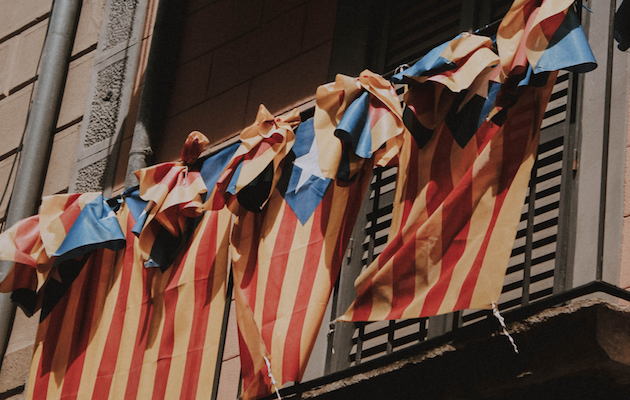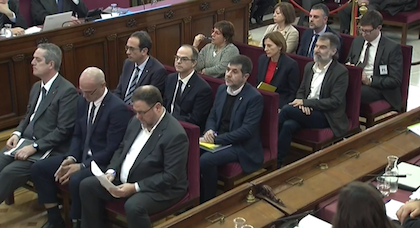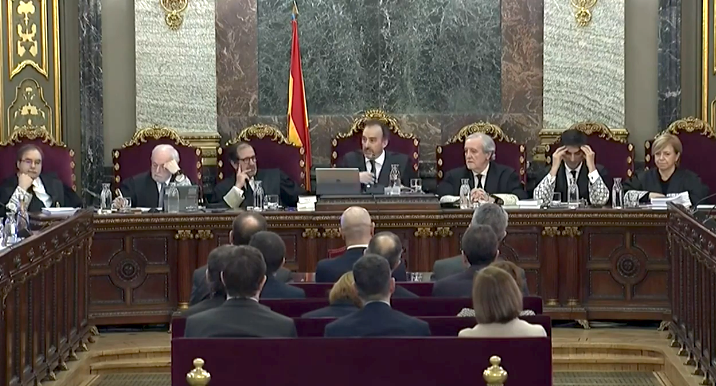Twelve Catalan pro-independence leaders are being judged in the Spanish Supreme Court. The trial generates a public debate that transcends the judicial and the political scene.
 Photo: Mas Reding, Unsplash CC
Photo: Mas Reding, Unsplash CC
The trial against Catalan separatists began this Tuesday. Ten former officials of the Catalan government and two activists of the two biggest civil society pro-indepence organisations sit on the bench of the Supreme Court.
They are accused of being responsible for organizing the unauthorised independence referendum held in Catalonia on October 1, 2017.
This is a unique trial, even historical many say, because, for the first time in the history of the Spanish democracy, public officials are judged because of alleged crimes of rebellion and sedition.
The Vice president of the Spanish Evangelical Alliance (AEE), Xesús Manuel Suárez, believes that this trial comes “after a complete failure to use political tools to find a solution”.
However, such a unique trial is provoking reflections at different levels, not only in terms of politics and justice, but also ethics or identity.
A TRIAL, THE CORRECT TOOL FOR THIS SITUATION?
The legitimacy of the trial has been the main focus of the debate so far.
While the defendants have prepared their defense, in the same way that they ended up presenting the lists for the elections of December 21, 2017, after the application of Article 155 and the dissolution of the Catalan Parliament, with the first interventions the debate has become mainly political.
“These things are not solved by judicial means, and as evangelicals we should know that, because we are convinced that the disagreements must be addressed directly, with a will to understand the other party”, Suárez says.
From a legal-technical perspective, however, the President of the Forum of Evangelicals of the Law, Eliseo Gómez-Lor, clarifies that “we must reject the insinuation that it is a political trial”.
“Our legal system does not persecute the independence movement as a doctrine or political point of view, on the contrary, it facilitates channels for its manifestation. It is not a crime in Spain to be a separatist, or to run for an election with a program where the aim is to obtain the independence of a part of the territory, while in Germany, for example, it is a cause to outlaw the political parties”, adds the lawyer, who thinks that "the political fight, stays in politics."
For others that line is thin and difficult to distinguish. “We expect a fair trial, but we fear a visceral revenge”, says Natanael Planes, who represents the group Protestants per la República (Protestants for the Republic in Catalan), and sees a series of irregularities in the entire process prior to the start of the trial, such as the preventive detention of the accused. or the Supreme Court.
According to the lawyer Juan Miguel Torres, it is a case that “has to be addressed with total democratic normality, a response of the rule of law".
“A democratic state must be characterized by respecting the rule of law, and all powers and citizens must submit to the laws and the fundamental norm, as is the Constitution of a country”, he points out.
LEGAL AND POLITICAL IDENTITIES
“The Catalans protest because we are excluded from certain political decisions”, said former Vice president Oriol Junqueras' lawyer, Andreu Van den Eynde, before the three magistrates of the Supreme Court in his first intervention in the trial.
 The first session of the trial atthe Supreme Court. / CGPJ
The first session of the trial atthe Supreme Court. / CGPJThe trial against Catalan separatists has also shown how intangible is the separation between ideology and identity sometimes.
“Any trial on events that have had a media impact is a challenge, because the judges are aware that their considerations will be widely known and that many people already have a opinion formed apart from the judicial process”, Gómez-Lor comments.
And adds: “this is not a problem for the Supreme Court because almost all the trials about facts that have been debated in the mass media, end there”.
“Democracy is not a political system that guarantees easy solutions; the totalitarianisms are the ones who look for for those solutions. Democracy allows individuals and groups to express their deepest convictions freely, and it also allows the free concurrence of ideas and proposals”, defends Suarez.
According to the Vice president of the AEE, the evangelical perspective also provides solutions that could have avoided this scenario.
“God does not impose the identity on any of us, we decide it freely, by voluntarily recognizing his sovereignty; How, then, do we dare to impose identity on any group? That is why evangelicals should understand that identity is not imposed: it is voluntarily acknowledged”.
Suarez stressed that “God had all the legal weapons to condemn us, but He did not conform to legality, and, having the power and legitimacy, He took the first step to the reconciliation with us, overcoming the law”.
“The recognition of the other, of their different identity, and the willingness to reach an agreement are better ways to coexist", he concludes.
Lawyer Torres believes that “it is the law itself that legitimises the process and the judges, and not the ideology or identity , which cannot contaminate the impartiality of justice”.
“The criminal legal technical issue must not be confused with a certain reality of a sector of society [...] The Rule of Law must prevail for democratic hygiene, regardless of who is being investigated”, Torres points out.
He thinks that “there is a certain interest among some sectors of the population, in ringing the differences between the Catalan population to judicial institutions, and of course, that is neither right, nor real”.
ARE THERE WARRANTIES OF A FAIR TRIAL?
The expectations about the trial make the debate tense, because the points of view of eah part are very further away.
“Spain has a very secure judicial system. We are seeing every day how politicians from different parties, including people related to the Royal House, have been or are being judged, and even sentenced and serving prison sentences”, says Torres.
Gómez-Lor also notes that “the guarantees are based on the experience of a large number of trials against all kinds of public officials that have taken place during the democratic stage, which in general show a high degree of neutrality of the judges, regardless of what their political convictions are”.
 The magistrates of the Sipreme Court. / CGPJ
The magistrates of the Sipreme Court. / CGPJ“There are exceptions, so that it is very important to avoid that this process becomes one of them”, he points out.
For the President of the Forum of Evangelicals of the Law, “what generates the greatest suspicion of partiality of justice is the system of election of the General Council of the Judiciary, and, consequently, of the President of the Supreme Court” .
“This could be improved, but the Council does not have the capacity to influence the decisions of magistrates when they are judging specific cases”, Gómez-Lor explains.
“Let's not be naive. The sentence is already written the statements of judges and members of the Spanish government ratify that. It is a definitively political sentence that will be presented with legal arguments”, Suárez says.
According to the Vice President of the AEE, “for many Spaniards the essential thing of the process is to find legal instruments that justify bringing the Catalans to heel”.
The defendants face fines that could range from 12 years, in the case of the crime of sedition, to 25 years for rebellion, as requested by the Prosecutor's Office.
The emergent far-right party Vox has presented a popular accusation, requesting in some cases up to 70 years in prison. That time would be added to the year and three months that most of the defendants have already been in custody.
“An alleged criminal act, sanctioned with very serious fines, is being prosecuted, and that is why preventive detention has been applied. The preventive detention, which has been applied in Spain normally, is not arbitrary”, Torres explains.
A LONG PROCESS
The trial is expected to last for months, so the sentence may not be known until the second half of the year. Coinciding with the beginning of the trial, there have been many demonstrations in the main cities of Catalonia.
Protestants per la República held an evening of prayer “for political prisoners” on February 2, and they are planning different meetings to follow up on the case.
“We do not have an agenda, but we have agreed to have more praying meetings. Many of us have coincided in the mobilizations that have been called to call for justice and freedom, and we will continue to do so, peacefully but with determination”, explains Planes.
It is sure that the sentence will have consequences that will transcend the judicial, and even the political scene.
“The image of justice in relation to the trial will not come from the technical and legal role played by justice, but from the media campaigns that are made of the event , both here and abroad”, says Gómez-Lor.
Therefore, "the vision of legitimacy of the trial can weaken, depending on what everyone sees, read or listen, but not the legitimacy itself, unless the court can not get away from the media judgement”, he adds.
“If the sentence just contrast the facts with the law and it does not enter into political insults, it will reinforce its prestige”.

Las opiniones vertidas por nuestros colaboradores se realizan a nivel personal, pudiendo coincidir o no con la postura de la dirección de Protestante Digital.
Si quieres comentar o